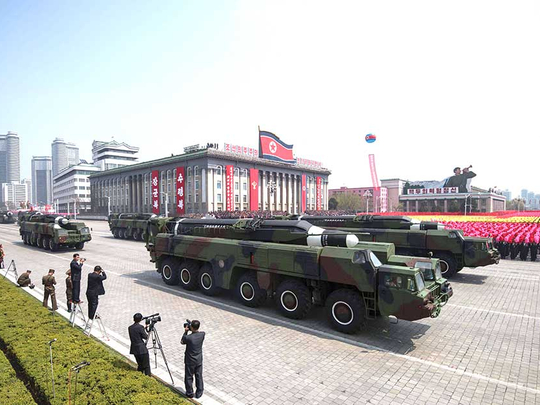
Seoul: Sanctions, threats and engagement have all played a part in bringing North Korea to the negotiating table, but it is likely to demand an unacceptably high price to abandon its weapons programmes, analysts say.
Seoul announced Tuesday that the North’s leader Kim Jong-un was ready to open talks with the United States and willing to consider giving up his nuclear bombs and ballistic missiles in exchange for security guarantees.
It is a stunning turnaround after a decades-long military build-up that has seen Pyongyang subjected to multiple rounds of sanctions imposed by the UN Security Council, the US, the European Union, the South and others.
Even the frequently bellicose US President Donald Trump welcomed the announcement as “very positive” and apparently sincere — although he noted: “We’ll soon find out” whether that is the case.
Previous negotiations and agreements have ultimately come to nought and the shape of any final deal is far from clear, with both sides holding deeply entrenched positions.
In recent months Trump had threatened to rain “fire and fury” on the North and “completely destroy” it, while administration officials have repeatedly described military action as “an option on the table”.
“North Korea is opening up because the pressure from the US was too much,” said Go Myong-hyun, an analyst at the Asan Institute of Policy Studies.
For years, as Pyongyang developed its weapons and missiles to the point where it last year detonated a device it said was an H-bomb and launched rockets capable of reaching the US mainland, the UN sanctions against it were confined largely to asset freezes and travel bans.
That has changed more recently, with broad-based bans on its coal and seafood exports, textile trade and new contracts for overseas workers, along with limits on oil imports, threatening to impact the wider economy.
“Sanctions are biting,” former US representative to the Six Party talks Joseph DeTrani told the online journal The Cipher Brief. “North Korea is more isolated now than they’ve ever been, to include with their key ally, China.
‘Significant impact’
“It’s a combination of the sanctions, the joint military exercises, and a Moon government that is very willing to have a dialogue with the North that made a significant impact.”
The South’s Winter Olympics in Pyeongchang provided a window of opportunity to engage the North, with Kim sending his athletes to take part and his sister to attend the opening ceremony.
The flurry of cross-border trips gave South Korean President Moon Jae-in a chance to try to broker talks between Pyongyang and Washington, and he will hold a summit with Kim next month in the Demilitarised Zone that divides the peninsula.
The North itself has yet to make any public confirmation of the concessions Seoul says it has offered.
Exactly what it might mean by the “security guarantees” it wants in exchange for denuclearisation remains unclear — and crucial.
“At one end of the spectrum would be their acceptance of a statement by the United States that it has no intention of attacking North Korea,” wrote Mark Tokola, vice president of the Korea Economic Institute of America.
“At the other end would be a demand that US forces leave the Korean Peninsula and that the US-ROK military alliance be scrapped,” he added, using the abbreviation for the South’s official name.
Ulterior motives
That would amount to a redrawing of the strategic map of northeast Asia — which is likely to be unpalatable to Washington.
It would also leave the South dependent on its own resources and forces in the event of any future conflict with the North, which constantly expresses its desire to reunify the peninsula — a prospect that many South Koreans would oppose.
And Pyongyang could yet have ulterior motives.
“It seems most likely that North Korea may be trying to drive a wedge between Washington and Seoul by trying to lure South Korea into weakening the alliance,” Tokola added.
Annual joint military exercises are due soon which Pyongyang regularly condemns as preparations for invasion.
Kim is said to have told Seoul’s officials that he will be “understanding” about the Foal Eagle and Key Resolve drills, but Koo Kab-woo, a professor at the University of North Korean Studies, expects them to be scaled down.
“What that means is that adjustments are being made to the South Korea-US alliance,” he told AFP.
And the decades-old alliance could be further strained once Pyongyang and Washington sit down for talks, analysts said.
“The negotiations between the US and North Korea won’t be easy, given the Trump administration’s firm stance about complete denuclearisation,” said Kim Hyun-wook, a professor at the Korea National Diplomatic Academy.
South Korea could find itself in an awkward position with its key ally if the talks fall apart.
“There are so many things to iron out before actual denuclearisation talks begin and frankly, South Korea’s summit with the North in April seems a bit hasty,” Kim said.
“What’s worrisome is that Seoul and Washington will not be able to coordinate their North Korea policies and go in opposite directions.”











